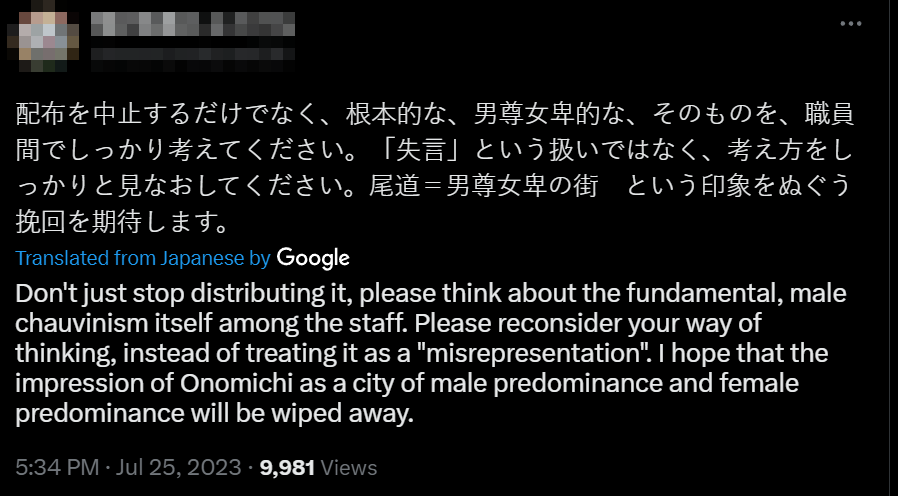Mayor Apologises After Japanese City Distributes Flyers Telling Pregnant Women To Cook & Clean
A Japanese city faced nationwide anger after the local flyers carrying messages for pregnant women many deem misogynistic spread on social media.
Onomichi City in Hiroshima conducted a public survey in 2017. The city then used the results in the creation and distribution of flyers for pregnant women.
The flyers recommended the new mothers to please their husbands by doing the household chores, preparing their lunches, and always smiling around them, amongst other things.
However, after an outcry on social media, the city’s mayor apologised on Twitter.
Flyers tell women to please their husbands by cleaning and cooking
Onomichi, a city in Hiroshima Prefecture, conducted a public survey of 100 fathers in 2017. The city government used the responses in the creation of flyers aimed at heavily pregnant women.
They were titled ‘From an experienced dad to you’, according to Japanese news site The Mainichi. The flyers contained various prompts asked in the survey and published the top three responses from the fathers.
The colourful flyers, with cartoon flowers and couples, contained such ‘advice’ as: “There are differences in the way men and women feel and think. One of the reasons for this is the structural difference in the brains of men and women.”
Furthermore, the flyer said, “It is known that men act based on theories, while women act based on emotions”.
The flyers encouraged households to “divide roles well” and also advised expectant mothers to show appreciation to their husbands.
The wives could also “please their husbands” by doing the household chores, handling the childcare, preparing their lunches, giving them massages, greeting them, and always smiling.
600 flyers mailed per year to pregnant women
One of the prompts featured in the survey was “Attitudes (or words) from my wife that I didn’t like”, according to The Mainichi.
The surveyed fathers especially complained that the new mothers would “get frustrated for no reason”.
Surveyed fathers disliked when their wives would care for the baby and not do housework. In addition, they were unhappy when their wives would do housework instead of caring for the baby.
The city mailed 600 of these flyers per year to seven-month-pregnant women, since Apr 2018.
It should be noted that the MGH Center for Women’s Mental Health states that 85% of women experience mood disturbances in the postpartum period.
This includes mothers who “get frustrated for no reason”, indicating it’s not something they can control.
Japanese flyers generate fury on social media
Despite the distribution of the flyers for five years, it was only recently (July 2023) that it spread onto social media.
Reactions were that of outrage. Commenters criticised them for misogynistic messages.

Source: Facebook
Other women also related their own experiences, one of them saying her efforts weren’t reciprocated or appreciated.

Source: Facebook
One commenter noted that the flyer was expecting only one-sided care from the mothers.

Source: Facebook
On 25 July, the city’s mayor, Yukihiro Hiratani, posted a public apology on the city’s government website and Twitter.
In it, he said that the flyers were “not in line with the sentiments of pregnant women, childbearing mothers, and others involved in child-rearing, and caused unpleasant feelings for many people”.
Additionally, Mr Hiratani stated that the distribution of the flyers would cease.
Japanese gender norms causing falling birth rates
Commenters pointed out that the results coming from public surveys of men indicated the beliefs on the flyers were a societal issue.
One said that merely stopping the flyer distribution did not tackle the underlying issue of chauvinism among staff.

Source: Twitter
The World Economic Forum ranked Japan 125th out of 146 countries in their Global Gender Gap Index 2023.
The report also stated that Japan had some of the worst gender representation in politics. Women held only 10% of parliamentary and 8.3% of ministerial positions.
The BBC reported just last year, that a number of Japanese medical schools manipulated admissions to unfairly exclude women.
Pregnant women and new mothers were also discriminated against at work, according to the Tokyo Weekender.
The unfair burden placed on women by outdated gender norms is cited as one reason for the country’s falling birth rates. Japan saw its lowest number of births in its recorded history in 2022, according to CNN.
Have news you must share? Get in touch with us via email at news@mustsharenews.com.
Featured image adapted from Unsplash.










